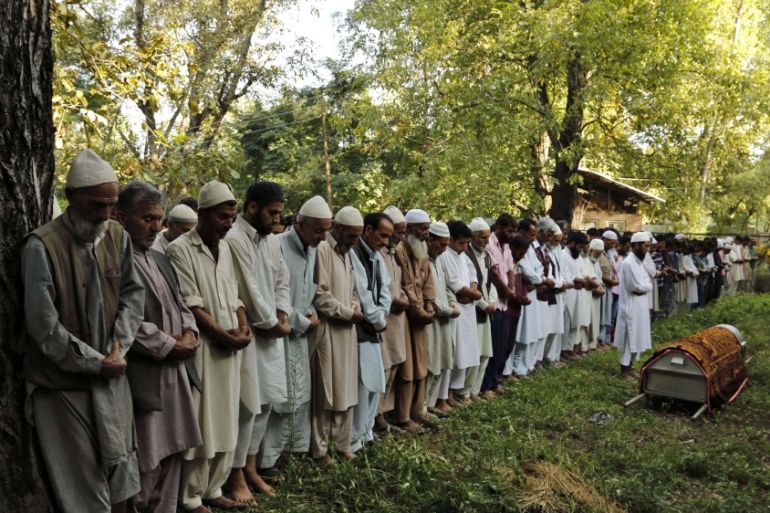UN chief expresses ‘concern’ over violence in Kashmir
Ban Ki-moon calls upon India and Pakistan to exercise maximum restraint after deadly clashes along border.

United Nations Secretary-General Ban Ki-moon has voiced alarm at the latest upsurge in violence along the disputed border of India and Pakistan in Kashmir that has killed at least nine people since last week.
In a statement released on Tuesday, the UN chief urged both governments of India and Pakistan to exercise maximum restraint and take all feasible steps to ensure the protection of civilians after the two countries continued to exchange heavy mortar fire almost daily over the past 10 days.
“[Ban] expresses serious concern about the recent escalation of violence along the Line of Control between India and Pakistan, which reportedly resulted in a number of casualties on both sides, including civilians,” the UN press office said in a statement.
On Sunday clashes between Indian and Pakistani troops along the border intensified killing at least eight people and wounding 14.
The Indian-administered Kashmir has seen a spurt in violence in recent months and the UN’s statement on Tuesday came as two people, including a policeman and a civilian, were killed when suspected rebels opened fire outside a Muslim shrine about 55km outside the capital Srinagar.
Rebels in recent years have often attacked lone police officers on duty and snatched their service weapons.
![Frontier clashes have intensified in recent months and the latest violence is likely to put more strain on ties [AP]](/wp-content/uploads/2015/08/ca6a401951a14099ac6a0c8370c82130_18.jpeg)
The ruling People’s Democratic Party (PDP) in Indian-administered Kashmir blamed the uptick in violence on elements across the border in Pakistan.
“This is not a peaceful border, there are often clashes there …there are people on the other side [Pakistan-administered Kashmir] that don’t want us to succeed with our mandate of peace,” Waheed-Ur-Rehman, a youth leader and spokesperson of the PDP, told Al Jazeera.
But following the clashes on Sunday, in which one civilian was killed and four others injured in areas of Pakistan-administered Kashmir, the Pakistan army said in a statement that India [had] “started unprovoked firing in the afternoon … Pakistani troops fittingly responding to Indian firing.”
Question of AFSPA
The PDP-led state government has been under intense pressure to revoke a special law, the Armed Forces Special Powers Act (AFSPA), in place since 1990 that gives immunity to Indian armed forces in disputed region.
”There
that don’t want us to succeed with our mandate of peace”]
Rehman of PDP, which shares power with right-wing Bharatiya Janata Party, said his government had inherited AFSPA, and said revoking the law “was a process that would take time”.
In July, human-rights group Amnesty International released a report documenting the obstacles to justice faced in several cases of human rights violations perpetrated by the Indian army in Kashmir.
The group noted that their research “has repeatedly uncovered patterns of impunity, including unlawful government orders to the police not to register complaints of human rights violations against the security forces”.
“We are handling the issue of AFSPA sensitively; we don’t want to create a situation where forces are embarressed but certainly AFSPA has lost its moral legitimacy in Kashmir,” Rehman said.
Frontier clashes have intensified in recent months and the latest violence is likely to put more strain on ties between the two countries who are scheduled to hold talks on August 23-24 in New Delhi. The UN welcomed that scheduled meeting and urged both countries to resolve their differences through dialogue.
On Wednesday, the Times of India reported that Pakistan had invited Kashmiri separatists for talks with Sartaj Aziz, Pakistan’s National Security Advisor, on August 23 in New Delhi.
“Over a dozen separatist leaders, including Syed Ali Shah Geelani, Mirwaiz Farooq and Yasin Malik, have been invited for a dinner with Pakistani NSA Sartaj Aziz in New Delhi,” local media reported. Aziz will travel to India on August 23 for talks with his counterpart Ajit Doval.
In August 2014, India cancelled foreign secretary-level talks after the Pakistan high commissioner in New Delhi held consultations with Kashmiri separatists.
The Asian neighbours have fought three wars since independence in 1947, two over Kashmir, and relations chilled again after the election of the Narendra Modi of BJP as Indian prime minister last year. The conflict has left tens of thousands, mostly civilians, dead.